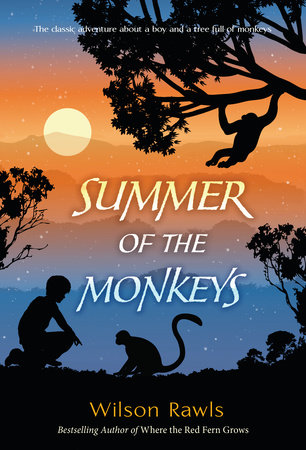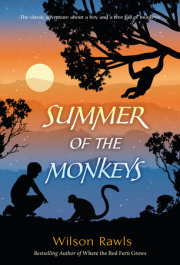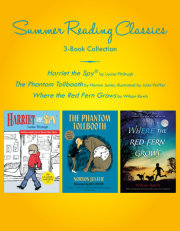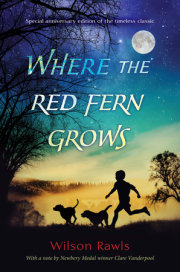Chapter One
Up until I was fourteen years old, no boy on earth could have been happier. I didn't have a worry in the world. In fact, I was beginning to think that it wasn't going to be hard at all for me to grow up. But just when things were really looking good for me, something happened. I got mixed up with a bunch of monkeys and all of my happiness flew right out the window. Those monkeys all but drove me out of my mind.
If I had kept this monkey trouble to myself, I don't think it would have amounted to much; but I got my grandpa mixed up in it. I felt pretty bad about that because Grandpa was my pal, and all he was trying to do was help me.
I even coaxed Rowdy, my old bluetick hound, into helping me with this monkey trouble. He came out of the mess worse than Grandpa and I did. Rowdy got so disgusted with me, monkeys, and everything in general, he wouldn't even come out from under the house when I called him.
It was in the late 1800s, the best I can remember. Anyhow -- at the time, we were living in a brand-new country that had just been opened up for settlement. The farm we lived on was called Cherokee land because it was smack dab in the middle of the Cherokee Nation. It lay in a strip from the foothills of the Ozark Mountains to the banks of the Illinois River in northeastern Oklahoma. This was the last place in the world that anyone would expect to find a bunch of monkeys.
I wasn't much bigger than a young possum when Mama and Papa settled on the land; but after I grew up a little, Papa told me all about it. How he and Mama hadn't been married very long, and were sharecropping in Missouri. They were unhappy, too; because in those days, being a sharecropper was just about as bad as being a hog thief. Everybody looked down on you.
Mama and Papa were young and proud, and to have people look down on them was
almost more than they could stand. They stayed to themselves, kept on sharecropping,
and saving every dollar they could; hoping that someday they could buy a farm of their
own.
Just when things were looking pretty good for Marna and Papa, something happened.
Mama hauled off and had twins -- my little sister Daisy and me.
Papa said that I was born first, and he never saw a healthier boy. I was as pink as a sunburnt huckleberry, and as lively as a young squirrel in a corncrib. It was different with Daisy though. Somewhere along the line something went wrong and she was born
with her right leg all twisted up.
The doctor said there wasn't much wrong with Daisy's old leg. It had something to do with the muscles, leaders, and things like that, being all tangled up. He said there were doctors in Oklahoma City that could take a crippled leg and straighten it out as straight as a ramrod. This would cost quite a bit of money though; and money was the one thing that Mama and Papa didn't have.
Mama cried a lot in those days, and she prayed a lot, too; but nothing seemed to do any good. It was bad enough to be stuck there on that sharecropper's farm; but to have a little daughter and a twisted leg, and not be able to do anything for her, hurt worst of all.
Then one day, right out of a clear blue sky, Mama got a letter from Grandpa. She read it and her face turned as white as the bark on a sycamore tree. She sat right down on the dirt floor of our sod house and started laughing and crying all at the same time. Papa said that after he had read the letter, it was all he could do to keep from bawling a little, too.
Grandpa and Grandma were living down in the Cherokee Nation of Oklahoma. They owned one of those big old country stores that had everything in it. Grandpa wasn't only a storekeeper; he was a trader, too, and a good one. Papa always said that Grandpa was the only honest trader he ever knew that could trade a terrapin out of its shell.
In his letter, Grandpa told Mama and Papa that he had done some trading with a Cherokee Indian for sixty acres of virgin land, and that it was theirs if they wanted it. All they had to do was come down and make a farm out of it. They could pay him for it any way they wanted to.
Well, the way Mama was carrying on, there wasn't but one thing Papa could do. The next morning, before the roosters started crowing, he took what money they had saved and headed for town. He bought a team of big red Missouri mules and a covered wagon. Then he bought a turning plow, some seed corn, and a milk cow. This took about all the money he had.
It was way in the night when Papa got back home. Mama hadn't even gone to bed. She had everything they owned packed, and was ready to go. They were both so eager to get away from that sharecropping farm that they started loading the wagon by moonlight.
The last thing Papa did was to make a two-baby cradle. He took Mama's old washtub and tied a short piece of rope to each handle. To give the cradle a little bit of bounce, he tied the ropes to two cultivator springs and hung the whole contraption to the bows inside the covered wagon.
Mama thought that old washtub was the best baby cradle she had ever seen. She filled it about half full of corn shucks and quilts, and then put Daisy and me down in it.
After taking one last look at the sod house, Papa cracked the whip and they left Missouri for the Oklahoma Territory.
Copyright © 1998 by Wilson Rawls. All rights reserved. No part of this excerpt may be reproduced or reprinted without permission in writing from the publisher.






